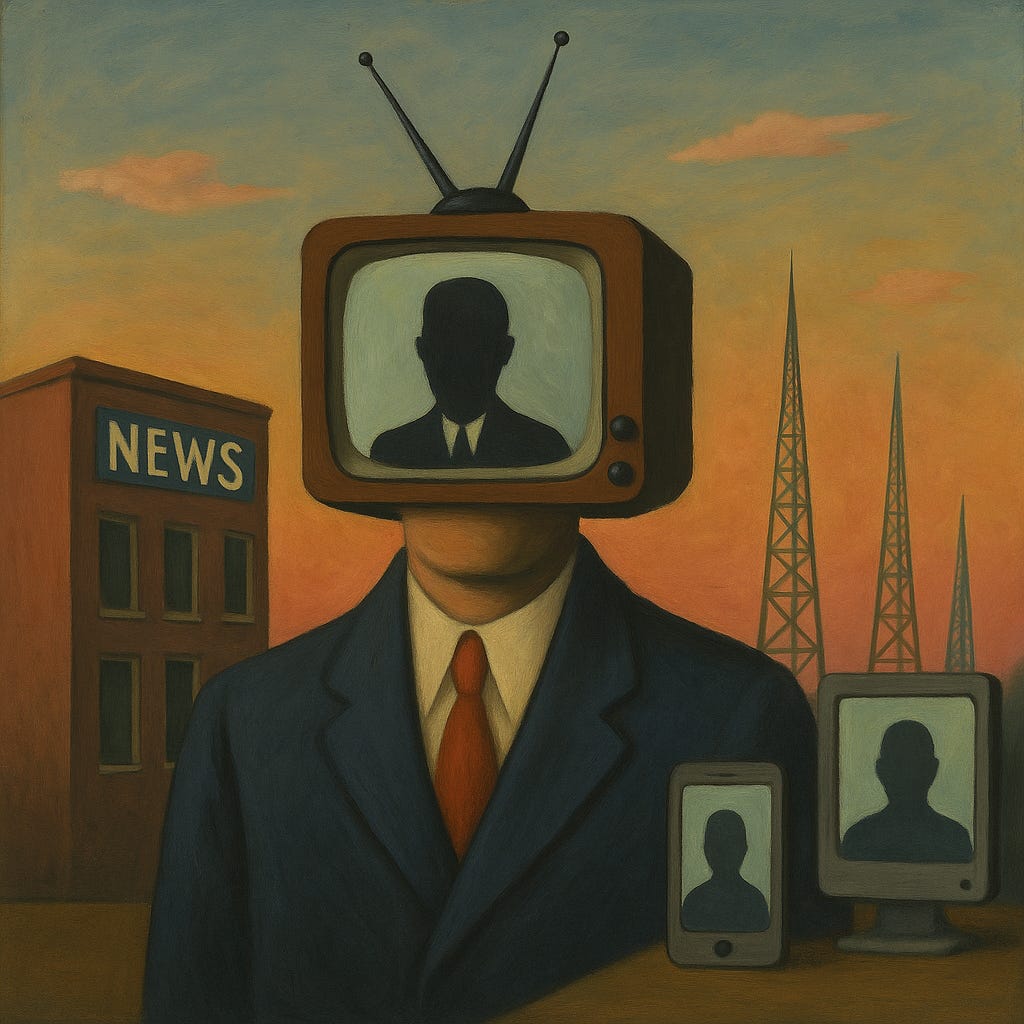Journalismus, Status und Polarisierung
Dieser Ausschnitt aus der gestern im Newsletter besprochenen Studie Polycentric Status Contests gehört zu den interessantesten Analysen, die ich über die Veränderung des Journalismus zu meinen Lebzeiten gelesen habe:
Before cable television, there have been so few television channels that we can classify TV journalism as a status club, unlike print journalism which has always had so many suppliers that being a print journalist carried only a prestige good.
The arrival of cable television, and the subsequent growth in TV journalism, provides an example of a technological shock turning a status club into a prestige good by breaking the capacity to exclude.
The internet created an additional technological shock that further affected journalism.
Who was or wasn't a journalist, especially at the very top of the profession, used to be controlled by elite institutions.
As it has been sometimes remarked, access even to print journalism was so restricted that the Unabomber engaged in extreme acts just to have an op-ed published in the Washington Post.
Today he would probably just self-publish his manifesto and promote it on social media, not only because self-publishing is so much easier, but also because the prestige of print journalism has declined.
The proliferation of blogs, YouTube channels, and social media accounts (as well as the removal of verified check marks for journalists on Twitter/X) have created a quasi-discontinuous jump in n, taking away control of entry from the traditional journalism institutions.
The result is that the prestige of being a journalist has declined.
Various critics of journalism (or of mainstream journalism) argue that the decline in prestige is due to various failures of truth seeking or undue politicization.
This confuses cause and effect.
The consequence of a large sudden increase in n is fragmentation and polarization because the only way of maintaining or regaining prestige is to create various more or less ad hoc reasons for exclusion.
The failures of truth seeking and the undue politicization are attempts at shrinking n by creating insider markers.
"Woke" journalists, "right-wing media", etc. are each attempting to deny legitimacy (and, hence, prestige) to members of their outer group.
Technology has created a vast pool of journalists and quasi-journalists, who are now scrambling to create islands of exclusivity and prestige.
The alternative to this fragmentation would be the elimination of journalistic prestige altogether.
(I'm not taking a normative stance here as to whether this would be preferable or not.)
Hier die zusätzliche Erklärung von ChatGPT-5 der Passage:
Ausgangspunkt: Status- vs. Prestige-Güter
Status club = exklusiver Club: Nur wenige dürfen hinein, Wert entsteht durch Exklusivität (z. B. Harvard-Diplom, wenige TV-Sender mit „Starjournalisten“).
Prestige good = öffentliches Gut: Viele können es haben, es bleibt aber trotzdem mit Anerkennung verbunden (z. B. Printjournalismus, weil es unzählige Zeitungen und Magazine gibt).
Wandel im Journalismus
Vor Kabel-TV
Es gab nur wenige TV-Sender.
Wer dort Journalist war, hatte automatisch hohen Status → Zugang war stark beschränkt, Wert stieg durch Knappheit.
Printjournalismus dagegen war breiter, also eher Prestige statt Status.
Kabel-TV
Mehr Kanäle = mehr Journalisten im Fernsehen.
Das Monopol/oligopolistische Exklusivitätsmodell brach zusammen.
TV-Journalismus wurde vom Statusgut zum Prestigegut.
Internet
Noch radikalerer Bruch: Blogs, YouTube, Social Media.
Jeder konnte plötzlich publizieren → kein klarer Gatekeeper mehr.
Folge: Prestige des Berufs „Journalist“ sinkt, da die Menge (n) der Anbieter explodiert.
Fragmentierung und Abgrenzung
Früher: Eliten (Zeitungen, TV-Sender) bestimmten, wer Journalist ist.
Heute: riesige Masse an „Journalisten“ und „Quasi-Journalisten“.
Ergebnis: Fragmentierung – viele kleine Status-/Prestige-„Inseln“.
Um trotzdem Exklusivität zu schaffen, versuchen Gruppen, Grenzen zu ziehen („wir sind die Wahren, die Anderen nicht“).
Beispiele: „woke“ Journalisten vs. „right-wing media“.
Politische Politisierung ist nicht Ursache des Prestigeverlusts, sondern Reaktion auf die Massenexpansion.
Kernaussage
Die Passage erklärt, dass der Verlust an journalistischem Prestige nicht primär durch schlechtere Arbeit oder Politisierung zustande kam, sondern durch technologische Veränderungen, die die Exklusivität zerstörten.
Mehr Kanäle (Kabel-TV) → Statusgut wird zum Prestige-Gut.
Internet & Social Media → Prestige zerfällt weiter, führt zu Fragmentierung und Polarisierung.
Die Politisierung ist ein Symptom, nicht die Ursache.


